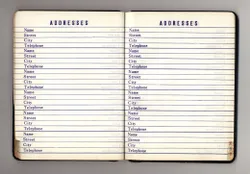
An address book is a curated collection of names and mailing addresses. Address books may be kept by an individual or published by a membership group or organization. When gathered and published by a group or organization, they are often referred to as a directory. The purpose of an address book or directory is to make available the contact information of individuals, couples, families, or groups of people.
A personal address book is divided so that contacts (of people and businesses) can be found in alphabetical order. Depending on the time period, an address book can include the following:
- Name
- Residential address
- Mailing address
- Phone numbers
- Fax numbers
- Email addresses
However, a personal address book may include information specific to the owner's needs, including birthdays or wedding anniversary dates and affiliations.
An address book is not a published city directory or telephone book. However, in some countries, city directories are called address books. City directories and telephone books are published by a company. City directories include names and addresses and, in some cases, the person’s occupation in a location. However, they don't include the name of everyone in that location. Wives and children may not be listed. In some cases, a wife’s first name may be included. City directories contain listings for municipal services as well as advertising.
In the case of a telephone book, the telephone company publishes the names and phone numbers as well as advertisements of their customers, which can span a city or region. A personal address book is limited to the names that the person or family wants immediate access to, such as family and close friends. In the case of a membership directory, those contacts are limited to members and will include information pertinent to contacting the person and the membership organization. City directories and telephone books are genealogical sources similar to address books but have different purposes.
Research your ancestors on MyHeritage
Information found in personal address booksInformation found in personal address books
One home source relevant to genealogical research is an individual or family's address book. A personal address book can be helpful to the genealogist because it reveals the family member's FAN Club (Friends, Associates, and Neighbors). The FAN Club should be used in research to locate records and to understand the ancestor's place in the community.
When a genealogist can access a personal address book, they should review it to identify possible family members. Information such as a residential address can help find family in other records such as the census and city directories.
Personal address books are ephemeral in that descendants may throw them away, but they can include contacts and other information noted by the owner, such as birth and death dates. They should be studied for possible family names and important dates.
Personal address books are primarily a late 19th or 20th-century source. However, it is possible to find address book-type information in other personal papers, including notebooks, diaries, and ledgers.
Published address booksPublished address books
The term "address book" includes more than a personal address book. It can refer to publications compiling names and address information for groups, churches, or organization members. Often referred to as directories, these types of address books will contain information relevant to the group about past or present members.
Other types of address bookOther types of address book
Other types of directories are not referred to as address books but, in reality, serve as such. For example, commonly referred to as "blue books," social directories are listings of upper socio-economic classes and contain information such as names, residences, occupations, affiliations, and family. Social directories are limited in who they list, and the eligibility of those included can change from year-to-year.
Locating address books and directoriesLocating address books and directories
Because address books and directories are ephemeral, they do not always exist. If an individual's address book exists, it will either be with the family or in an archival collection with other papers.
Directories are often updated yearly so that the old directory is meant to be thrown away, which means for researchers that they are rare. For groups and organizations such as membership, lineage, or academic groups (to name a few), consult archival collections for those groups for possible directories. Archival catalogs such as ArchiveGrid may list possible collections. To search archival collections, use a keyword search. The keyword will be the name of the organization. Additional searches should include the name of the location you are researching. Online digital collections might also house organizational directories.
See alsoSee also
Explore moreExplore more
- Directories, Guides & References — historical record collections on MyHeritage
- Sources for Genealogical Research You May Never Have Thought Of — article in the MyHeritage Knowledge Base

